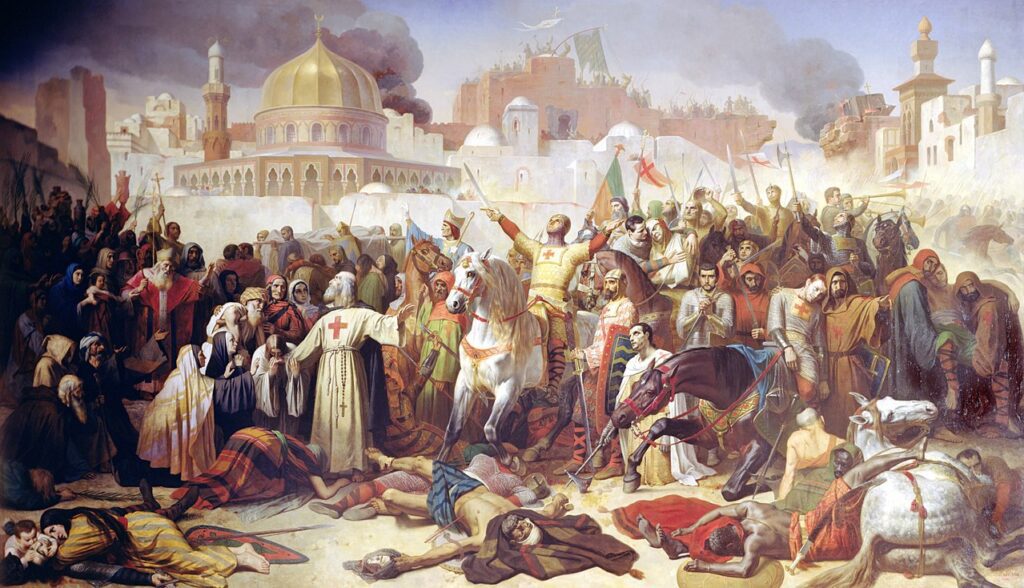The selling of indulgences did not stop with the Reformation. Originally, indulgences linked prayer and repentance with forgiveness: specified actions of good works or penance drew on the ‘treasury of merit’ of Christ as a way to reduce the severity of punishment for sins. They evolved into a kind of ‘war bond’ scheme through ambitious theological innovation prior to the First Crusade at the turn of the first millennium. Indulgences soon promised the forgiveness of sins for cash contributions or ‘taking the cross’ and fighting to accomplish initiatives of the church. The First Crusade preached by Pope Urban II at Clermont promised the remission of sins to those who joined to re-take Jerusalem from the Muslims and protect Eastern Christians. The legitimization of violence for spiritual ends such as securing the pilgrimage route, liberating Jerusalem’s Holy sites, and conversion of the Saracens (Muslims) and Jews were mixed with apocalyptic narratives, material greed, and ethnic vengeance in the Middle Ages.

There is much nuance and interesting discussion surrounding the Crusades: who was on offense or defense, motivations, expansionist desires of Muslims and Christians, and the various personalities over five hundred years of upwards of nine Crusades. The main point here is that gaining spiritual reward through hostility against pagans, Jews, or Muslims became a practically acceptable theological position. The linking of salvation through hostility was a common practice of the church for hundreds of years—and I argue is still painted as orthodox today.
One scholar says, “The lobbying from rulers for their wars to be validated [by the church] had been incessant from the time of Constantine.”[i] Indulgences and their link to violence were a consequence of the church coming into political power. While ‘God is on our side’ thinking is not exclusive to Christianity, the swings in orthodoxy on the issue are unique. The church fathers’ condemnation of war and violence is without exception and the first four centuries of Christian writings are unanimous in their pacifist teaching.[ii]
Ambrose and Augustine first elucidated ‘just war’ ethics, whereby hostility could be carefully measured within bounds. Forced baptism as a tool of war and the ethics of loving one’s neighbor and enemy through coerced conversion and violence were carefully nuanced. This new church teaching stood in stark contrast to the early centuries and innovations escalated over the next five hundred years. Reynolds traces the development of Christian thought on violence and warfare as subsequent rulers from Constantine onward sought justification for their territorial advancement. In the preaching of the Crusades, subsequent popes, monks, and abbots associated the process of conversion with conquest and devised spiritually manipulative ways to underwrite and motivate it, such as indulgences.
By the time of the Baltic Crusades, “warfare was not just a ‘necessary evil’ but a major, if not the major, instrument of conversion” and territorial expansion. There was no smoothing over or spiritualization of these Crusades, just “brutal blood spilling for God.”[iii] The Crusaders saw themselves as ‘Soldiers of Christ’ and equated spilling of infidel Muslim blood with chivalry, honor, and devout spiritual duty.[iv]
While the medieval ages may be over, linking salvation, duty, and honor with a legitimization of hostility in the name of God is not. Hostile actions take the form of discrimination, verbal attacks, contemptuous speech, and slanderous social media. Intimidation is justified by slick preachers who erect scaffolds of misinterpretations of Jesus and the money-changers, Phineas or David’s military campaigns to issue apocalyptic fear and justify hostility.
Indulgences continued to be a main theme throughout the Middle Ages and were ‘sold’ for five hundred years all the way through the Reformation. Spanish and Portuguese expansion to the new world, the Reconquista, and the Inquisition all leveraged the amalgam of indulgence, national superiority and expansion, God-ordained hostility, and spiritual duty. While Luther railed against the selling of indulgences for the building of a cathedral in 1517, his contemporary Erasmus criticized Pope Leo X’s crusading plans. John Huss, the Czech theologian and early reformer, rebelled against papal fundraising for a Crusade via indulgences a hundred years prior and was excommunicated and later burned at the stake (for this and other reasons). His followers, the Hussites, endured five subsequent Crusades, committed their own acts of hostility, and they eventually fell in the 1620s to Hapsburgs who undertook an aggressive re-conversion campaign attempting to return them to Catholicism.
Even revered clergy like Luther, Aquinas, and Calvin, while eschewing indulgences, argued for a kind of compartmentalization to justify violence. Luther acknowledged the difficulty of living in two Kingdoms: one in the present earthy state where violence may be consequentially necessary, and the Kingdom of God where it is not. Aquinas promoted two ‘counsels’; those of ‘perfection’ for clergy who should love enemies and hold to higher ethics and a lower standard for Christian laity and governors who were not obliged to eschew violence. Calvin supported the elimination of theological opponents, claiming execution could align with God’s purposes. This is necessarily simplistic but illustrates that great thinkers have struggled with the theology and ethics.
Grants of indulgences involving cash fees or other financial or land transactions were not ruled out until 1567. While the Catholic church has reigned in some of the excesses of indulgences they still exist in various official forms through the absolution of sins via charity, prescribed duties or time frames in prayer, Eucharist, or devotion of goods to the poor (read more on Partial and Plenary Indulgences). To be fair, Catholics today stress God’s mercy and forgiveness sought through penance and supplication, over the human acts or mechanisms that actualize it. The Protestant church may have formed as a result of opposition to these excesses and may not sell indulgences for cash or participation in literal crusade, but intimations of spiritual obligation and reward are still tightly linked with modern day hot-topics. Voting on abortion and other political party narratives, hostility toward out-groups such as Muslims, homosexuals, and ‘globalists’ (ironically a term with anti-semitic conspiracy links [v]), and the maintenance of homogenous ‘Christian’ power are all ‘sold’ by leaders from pulpits, podiums, social media, and newsrooms as ways to earn God’s favor.

Though I focus on the US primarily in this article, this is a global problem. Poland, the UK, Germany and others have strains of theologically motivated nationalistic violence. Lebanon is perhaps the best other example as it has struggled for centuries with violent Christian Nationalism. Druze and Maronite struggles for control throughout Ottoman times led to massacres in the 19th century. “Maronite gun” extremism and violence primarily from clergy supported militias were justified during the Lebanese Civil War (1975-1990) by ‘Christian land and heritage’ narratives combined with a theology of defense, identity, martyrdom and resistance to oppressors (link, link).
Apocalyptic themes are common in these movements, mixed with promises of financial gain and nationalistic superiority. Consider, in the US for example, former President Bush’s use of the word ‘crusade’ when announcing the ‘War on Terror’ after September 11, 2001. While retaliating against religiously justified Islamic violence, the sitting US president justified retaliatory Christian violence using medieval terminology. Other examples include frequent phraseology such as ‘soldiers for Christ’ in US military leadership or the dominionistic preaching of chaplains and US military personnel greying the lines between church, missionary conversion, and military action. Some in US military institutions like West Point seem to operate schools and the military as “a religious institute” and see the world dominated, as a special calling of the USA, by a warrior Jesus who helps those who kill. To be clear, nations have a justifiable obligation to provide for a common defense, however a line is crossed when hostility in the name of any nation-state is theocratized.
In the civilian world, it was more than poor nomenclature in the evangelistic ‘crusades’ of Billy Graham and many others who intertwined their popularity with politics. Graham, later at 92, expressed regret at his political involvement with Nixon, but the picture of successful evangelist on ‘crusade’ while an official advisor to a US President casted a shadow. Other examples are poignant such as the apocalyptic predictions of Dr. James Dobson in 2008 regarding what would happen to American Christians if they didn’t vote Republican and the Democratic party was to come to power (none of which came true) or those of Eric Metaxas or other right-wing pundits about ‘existential threats’ in 2020. Churches and Christian leaders linked true faith with votes, violence, and religious and military symbols at the DC Jericho March, saying, “We need to fight to the death, to the last drop of blood,” as ‘Don’t tread on me’ flags, Bibles, fatigues and camouflage, prophecy and prayers for America, a blowing Jewish ritual ram’s horn, and Air Force One overhead painted an eerie mosaic of a new theocracy. The January 6, 2021 Capitol riots featuring violence, a public executioner’s noose, and military themes mixed with Christian religious symbols such as crosses, “Make America Godly Again,” and “Jesus Saves” banners.
Stirring up fear in the faithful, linking evangelism and hostility in Jesus’ name, and selling indulgences are still in practice today, albeit indirectly, not for cash or gold but for votes, loyalty and contempt towards the ‘other’.
Chivalry and knighthood are now patriotism and gun rights. Liberating Jerusalem for pilgrims and Eastern Christians is now the fight against abortion and Muslim immigration. Cash payments for the remission of sins are now campaign contributions and mysterious super-PAC social media ads that fuel fear of a liberal dystopia funded by ultra-wealthy-right Christians. Converting the Saracens, Jews, and pagans by force of sword now becomes legislation of Christian society by codification, exclusion, mockery, hostility and political power.
It seems historically that course corrections may occur every few hundred years. Now, five centuries after Luther, is it time for another reformation? The conflation of faith in Jesus with politics, new crusades against ‘them’, and dangerous radicalizing rhetoric have yet again raised their ugly heads. Bernhard of Clairvaux’s charge in 1147 calling on Christians to “utterly annihilate or surely convert” the pagans and Muslims echos today as churches simultaneously preach a gospel for all nations and fund missions to the unreached yet incongruously refuse to engage with the ‘other’ in their midst and tolerate those who storm capitals and spew hate on social media in Jesus’ name. Theologically justified hostility towards the out-group du jour and violations of the 6th commandment pass for ‘zeal’ or ‘righteous indignation’ as cruelty, malice, hostility and violence permeate the church’s culture and posture. Sadly, mission and collective witness suffer in this environment, as double-minded souls scar over with the calloused tissue of self-righteousness.
The self-sacrificial lamb of God riding on a lowly donkey from the first advent has again been replaced with the apocalyptic warrior on a white horse of the second, but he’s riding for a shadow kingdom of man’s making. God help us de-link the gospel from the cancers of ‘othering,’ apocalyptic desires, millenarianism, ethnocentrism, Islamophobia, nationalism, violence, political dominance, and all the other ‘isms’ and return to the humble, counter-cultural ways of Jesus. God help us to discern the righteous content of our beliefs and repent of the sinful postures, hostile actions and cruel tone with which those beliefs are promoted. God help us undertake the ‘ministry of reconciliation’ for all nations without wholeheartedly aligning with a kingdom-nation of our own making. God help us.
[i] Housley, Norman. Contesting the Crusades. 1st edition. Wiley-Blackwell, 2008. p145.
[ii] Stassen, G., Just Peacemaking: The New Paradigm for the Ethics of Peace and War, 2008.
[iii] Reynolds, Burnam W. The Prehistory of the Crusades: Missionary War and the Baltic Crusades. 1st edition. Bloomsbury Academic, 2016, p69–70.
[iv] Housley, p129.
[v] Berger, J. M. Extremism. Cambridge, MA: The MIT Press, 2018. p 15.
